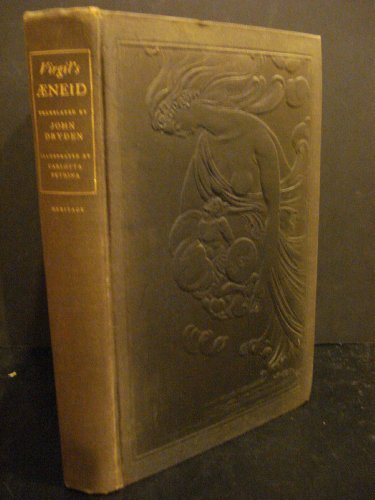-
The Aeneid
Virgil, J. W. Mackail
eBook (Otbebookpublishing, March 4, 2019)What made Virgil special was the artisanship behind his work (which was political, but gracefully and passionately evoked the soul) and the way in which he shaped his borrowed material to his and Augustus's and Rome's purposes.
-
The Aeneid
Virgil
eBook (GIANLUCA, Jan. 18, 2018)The Aeneid by Virgil
-
The Aeneid
Virgil
eBook (Zongo, April 6, 2017)In dramatic and narrative power, Virgil's Aeneid is the equal of its great Homeric predecessors, The Iliad and The Odyssey. It surpasses them, however, in the intense sympathy it displays for its human actors–a sympathy that makes events such as Aeneas's escape from Troy and search for a new homeland, the passion and the death of Dido, the defeat of Turnus, and the founding of Rome among the most memorable in literature.
-
The Aeneid: By Virgil - Illustrated
Virgil, Peter
eBook (, March 27, 2016)The Aeneid by VirgilHow is this book unique?Tablet and e-reader formattedOriginal & Unabridged EditionAuthor Biography includedIllustrated versionThe Aeneid (/ɨˈniːɪd/; Latin: Aenēis [ae̯ˈneːɪs]) is a Latin epic poem, written by Virgil between 29 and 19 BC, that tells the legendary story of Aeneas, a Trojan who travelled to Italy, where he became the ancestor of the Romans. It comprises 9,896 lines in dactylic hexameter. The first six of the poem's twelve books tell the story of Aeneas's wanderings from Troy to Italy, and the poem's second half tells of the Trojans' ultimately victorious war upon the Latins, under whose name Aeneas and his Trojan followers are destined to be subsumed. The hero Aeneas was already known to Greco-Roman legend and myth, having been a character in the Iliad, composed in the 8th century BC. Virgil took the disconnected tales of Aeneas's wanderings, his vague association with the foundation of Rome and a personage of no fixed characteristics other than a scrupulous pietas, and fashioned this into a compelling founding myth or national epic that at once tied Rome to the legends of Troy, explained the Punic wars, glorified traditional Roman virtues and legitimized the Julio-Claudian dynasty as descendants of the founders, heroes and gods of Rome and Troy.
-
The Aeneid
Virgil
eBook (GIANLUCA, Jan. 29, 2018)The Aeneid by Virgil
-
The Aeneid
Virgil
eBook (GIANLUCA, Jan. 10, 2018)The Aeneid by Virgil
-
The Aeneid: By Virgil : Illustrated
Virgil, Victor
eBook (Sunshine Classics, Jan. 30, 2016)About The Aeneid by VirgilHow is this book unique?E-reader & tablet formatted, Font Adjustments100% Original contentUnabridged EditionAuthor Biography InsideIllustrations includedThe Aeneid (/ɨˈniːɪd/; Latin: Aenēis [ae̯ˈneːɪs]) is a Latin epic poem, written by Virgil between 29 and 19 BC, that tells the legendary story of Aeneas, a Trojan who travelled to Italy, where he became the ancestor of the Romans. It comprises 9,896 lines in dactylic hexameter. The first six of the poem's twelve books tell the story of Aeneas's wanderings from Troy to Italy, and the poem's second half tells of the Trojans' ultimately victorious war upon the Latins, under whose name Aeneas and his Trojan followers are destined to be subsumed. The hero Aeneas was already known to Greco-Roman legend and myth, having been a character in the Iliad, composed in the 8th century BC. Virgil took the disconnected tales of Aeneas's wanderings, his vague association with the foundation of Rome and a personage of no fixed characteristics other than a scrupulous pietas, and fashioned this into a compelling founding myth or national epic that at once tied Rome to the legends of Troy, explained the Punic wars, glorified traditional Roman virtues and legitimized the Julio-Claudian dynasty as descendants of the founders, heroes and gods of Rome and Troy.
-
The Aeneid: By Virgil - Illustrated
Virgil
eBook (GIANLUCA, Dec. 22, 2016)How is this book unique?Font adjustments & biography includedUnabridged (100% Original content)Formatted for e-readerIllustratedAbout The Aeneid by VirgilThe Aeneid is a Latin epic poem, written by Virgil between 29 and 19 BC, that tells the legendary story of Aeneas, a Trojan who travelled to Italy, where he became the ancestor of the Romans. It comprises 9,896 lines in dactylic hexameter. The first six of the poem's twelve books tell the story of Aeneas's wanderings from Troy to Italy, and the poem's second half tells of the Trojans' ultimately victorious war upon the Latins, under whose name Aeneas and his Trojan followers are destined to be subsumed. The hero Aeneas was already known to Greco-Roman legend and myth, having been a character in the Iliad, composed in the 8th century BC. Virgil took the disconnected tales of Aeneas's wanderings, his vague association with the foundation of Rome and a personage of no fixed characteristics other than a scrupulous pietas, and fashioned this into a compelling founding myth or national epic that at once tied Rome to the legends of Troy, explained the Punic wars, glorified traditional Roman virtues and legitimized the Julio-Claudian dynasty as descendants of the founders, heroes and gods of Rome and Troy.
-
The Aeneid
Virgil, John Dryden
Paperback (CreateSpace Independent Publishing Platform, Dec. 29, 2014)The Aeneid VIRGIL (70 BC - 19 BC), translated by John DRYDEN (1631 - 1700) The Aeneid is a Latin epic written by Virgil in the 1st century BC that tells the legendary story of Aeneas, a Trojan who traveled to Italy, where he became the ancestor of the Romans. The first six of the poem’s twelve books tell the story of Aeneas’ wanderings from Troy to Italy, and the poem’s second half treats the Trojans’ ultimately victorious war upon the Latins, under whose name Aeneas and his Trojan followers are destined to be subsumed. The poem was commissioned from Vergil by the Emperor Augustus to glorify Rome. Several critics think that the hero Aeneas’ abandonment of the Cartheginian Queen Dido, is meant as a statement of how Augustus’ enemy, Mark Anthony, should have behaved with the Egyptian Queen Cleopatra.
-
AENEID.
Peter Virgil, & Dryden, John & Levi, Wenceslaus Cleyn, Francis & Hollar
(Folio Society, July 6, 1993)None
-
The Aeneid
VIRGIL (70 BC - 19 BC)
MP3 CD (IDB Productions, Jan. 1, 2016)The Aeneid is one of the most important epics in world literature and a story that continues to inspire works of art and literature even today. Originally written in Latin and comprising almost ten thousand verses in dactylic hexameter, the form of meter used in epic poetry in both Greek and Latin, the poem has been translated to almost every language in the world and it is re-translated over and over again, the most recent English translation having been provided by Barry B. Powell in 2015.The Aeneid tells the story of Aeneas, a legendary hero who takes part in the Trojan War, then travels to Italy after the war is over to found Rome. He may be familiar to those who have read Homer’s Iliad for he is a character in the classic Greek epic poem as well – Virgil takes this secondary character and makes him the protagonist of his poem, the legendary hero of many virtues who becomes the founder of the Roman Empire. Virgil’s epic poem comprises twelve chapters, out of which the first six tell the story of the journey of Aeneas and his men from Troy to Italy, while the second half tells about how the hero and his followers conquered the territory, winning the war against the locals. Virgil wrote The Aeneid between 29 BC and 19 BC, in a decade full of political conflicts and turbulence, but he never finished it (in 19 BC he travelled to Greece to revise the epic, but he fell ill and died soon after his return to Rome, without being able to complete the revision). Many literary historians consider the epic to be subversive of the political regime of Augustus, while others see it as a poem that praises the political leadership, the character of Aeneas bearing resemblance to Augustus, the Emperor. The poem enjoyed great success at the time of writing – Virgil recited parts of it in front of the Emperor as well.
-
Virgil: The Aeneid
Virgil, Carlotta Petrina, John Dryden
Hardcover (Heritage Press, Jan. 1, 1944)Publius Vergilius Maro, the friend of Augustus and great representative poet of the first age of the Roman Empire. Born October 15, BC 70 in Italy.